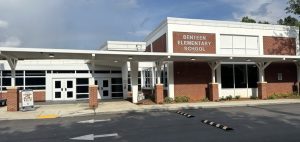By Paul Bolster, with AI assistance from Zoom
SE Neighbors Take Action held a conversation with five of the members of the Atlanta City Council who represent the southeast Atlanta. The March 20 discussion ranged over city issues including: budget cuts, zoning reform, transportation investments, affordable housing, commercial development, BeltLine rail, sidewalks, and the pending tree ordinance.
Participating in the discussion were Jason Winston and Antonio Lewis from Council Districts 1 and 12 and all three at-large members: Michael Julian Bond, Eshe Collins, and Matt Westmeorlend. Lilliana Bahktiari had a schedule conflict. Fifty-five individuals from many different neighborhoods participated in the Zoom meeting. A summary and full recording is available on the organization’s Facebook page.
The Budget. Mayor Dickens has asked city departments to prepare a 10% cut to their budgets. Several Council Members suggested that cuts could be made by eliminating positions that are not currently filled. Lewis said he was opposed to reducing the number of city workers. Several participants said there may be a need for more infrastructure project managers as projects funded by a sales tax are far behind schedule. Concern was expressed that the least prosperous areas of the city may be the last to get projects moving. Nobody suggested an increase in the millage rate.
Revenue got some attention. Collins and Lewis noted the need for more vigorous discussion with Fulton County regarding the low assessment of high-end properties. They expressed willingness to use their voice to get things “rightsized.” All recognized the failure to assess at sales values was distorting the city’s tax base.
Zoning and Affordable Housing. The group discussed the current draft of the zoning reform which is likely to give more flexibility to neighborhoods to structure density. Collins and Lewis said the plan did not go far enough to address the city’s need for affordable housing. There was general agreement that the plan could do more to solve this issue. Winston said he believes that diversity in housing types, duplexes, town homes, and small apartments, doesn’t effect the quality of life in the neighborhood. Bond agrees the city should prevent high-end developers with city subsidies from “buying out” their affordable housing commitments.
Transportation. The council members were all surprised by the Mayor’s announcement that he was stepping away from the rail project planned for the East Side BeltLine. Significant preliminary work had been done on the East Side BeltLine. However, they do plan to connect the existing trolley to the BeltLine. Participants expressed concern that pausing the most-planned rail would push any rail out for more that ten years. Both Winston and Lewis praised the decision to prioritize rail on the south side, where riders are more likely to need it and use it. It was not clear to anyone how quickly the new focus on the south-side rail project could get through the planning, design, financing, and funding phases of such a large undertaking.
Slow Progress on Infrastructure. All the Council Members expressed concern that Moving Atlanta Forward projects funded by a special sales tax were not further along. The first audit required under the legislation showed minimal progress. They are hoping for better results from a new administrator and the next audit. Most seemed willing to add new project management staff in order to get projects done but will wait for the department or the mayor to ask for the help.
Increasing Voter Engagement. All agreed to promote more voter engagement in the 2025 city elections. They offered to have their campaigns coordinate with SE Atlanta Neighbors. Westmoreland said his campaign would be “door knocking” in southeast Atlanta neighjborhoods and asked for help getting that done.
Tree Protection. Trees Atlanta took advantage of the forum to raise concerns about the tree ordinance currently before City Council. They hoped amendments could fill the gaps they feel exist. Bond, who has worked on the issue for several years, said he was not aware of the concerns but would be glad to listen to them. Some groups have advocated for passage in its current form. Lewis expressed concern a very restrictive ordinance might slow development in certain locations on the south-side.
Economic Development. Participants highlighted the need for responsible commercial development, especially grocery stores, in the southeast Atlanta. Lewis said he is working on a number of projects that needed stimulus from the City. Bond offered to work for a Tax Allocation District for the southeast in the future.
Sidewalks. Participants from Lakewood urged attention to the need for sidewalks along busy streets and highways in the area, especially on Jonesboro Road. There was general agreement that sidewalks should be an important part of the city’s transportation structure and that capital funds were needed. There is also a need for Georgia DOT to have highway standards that fit urban areas.





